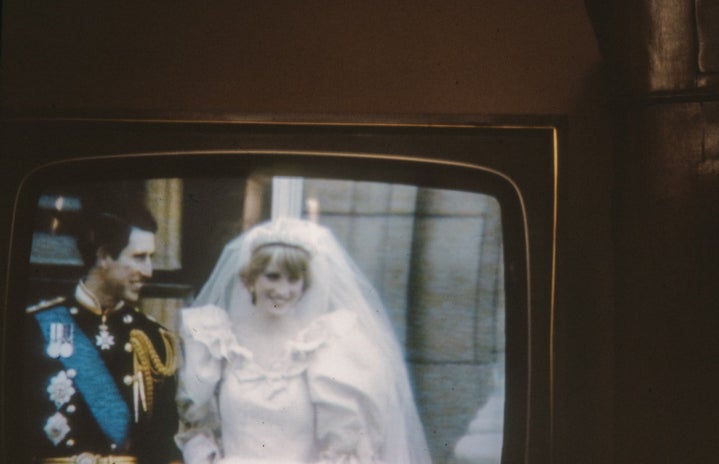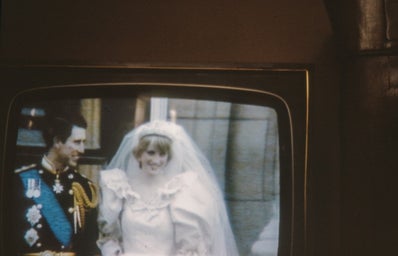Warning: spoilers ahead; talk of eating disorders, unreality, self-harm and mental health.
All of my friends know that I love Princess Diana. I’ve consumed just about every piece of media about her and have watched as many of her interviews as I can. I permanently consider her my greatest fashion icon (sorry, Harry Styles). So I’d been waiting for the release of Spencer for months, eager to see Kristen Stewart take on one of her most significant roles to date, but instead, I left the theater on the verge of tears. Not sad tears, but fearful tears – the movie that had been marketed as another Princess Diana biopic had instead been an unexpected psychological horror film.
What starts as a tense leadup to Christmas in the opening two minutes turns sinister very quickly – Princess Diana, lost in the woods on her way to stay with the Royal Family, is forced to admit just how lost she is in a roadside diner full of patrons who gaze hungrily at her, unable to believe that it is Princess Diana. Spencer is unnerving from the beginning – Stewart’s accent is clipped and quick, and words fall out of her mouth so easily that it’s akin to a confessional. We’re submitted to a lingering gaze from the first scenes, and it only gets worse.
At Sandringham, Princess Diana goes head to head with a nosy butler who can’t seem to leave her alone. His watchful gaze follows her everywhere: he knows where she is, what she’s doing, and what she should or shouldn’t be doing instead. He claims to be doing it to protect her from the photographers and press, yet we don’t see much of those photographers during the film, apart from one scene after the Christmas service. There’s a disconnect between what the butler tells us and what we, through Princess Diana, experience. He’s an all-seeing figure, and his gaze reaches into the audience throughout the film, making us feel that we are never truly alone. We, too, are submitted to that same consumption that Princess Diana is, forced to parry with the ever-watchful eye of the press and those she thinks she can trust within the Royal Family.
There’s a nauseating sense of unreality, as well, amplified by a dizzying soundtrack. Fever dream after fever dream blend into Princess Diana’s holiday weekend: she throws herself down a steep flight of steps, and the camera follows her, only to have the camera reveal afterward that it was only a dream. Princess Diana rips a pearl necklace from her neck at dinner in another scene and begins chewing the pearls as Prince Charles watches on, only to have the camera reveal afterward that it, too, was only a dream. Princess Diana makes herself sick and hallucinates her friendly maid Maggie there to help her, only to have the camera reveal afterward that it was just another dream and she’s stuck with unfamiliar faces surrounding her. But the reveals don’t stop the feeling of breathless anxiety that the audience experiences as they watch her, in graphic detail, harm herself and lose touch with what’s real. It’s only made worse by the soundtrack of spiraling brass instruments and tense strings that makes it seem like Princess Diana is in some nightmarish jazz club. Maybe that’s what it’s supposed to be doing: reducing the surroundings to some fantasy of form and role instead of sad personal drama. Through the frantic soundtrack of noise and delirious sonic patterns, the soundtrack projects how irreversible the spiral of Princess Diana’s mental health is and how much it has to do with her role in the Royal Family.
Spencer reaches beyond the realm of unreality in ways more graphic than anticipated and with no warning, unlike those that The Crown puts before episodes that depict disordered eating patterns. It catches the audience when they’re least expecting it, and it commands them to pay attention as reality loses meaning and all that is left is frantic emotion. It doesn’t mean that they should be forced to, however. It’s a nightmare for movie-goers everywhere, surrounded by watchful characters, a frantic soundtrack, and a lack of understanding of reality.
There’s goodness and joy in the movie, too. Princess Diana’s maid, Maggie, played by the fabulous Sally Hawkins, confesses to Princess Diana amidst dunes on a beach that she’s been in love with her for ages. Princess Diana responds with laughter, joy, and a deep sense of appreciation and care for the other woman who loves her for being Diana, not the Princess. A lively scene on the beach as the two dance isn’t enough to make up for the two hours of psychological horror and mental distress, though. The trauma of the film can’t be wrapped up in a bow and dismissed as Princess Diana sings in the car with her sons.
Maybe that dichotomy and dissonance are where Spencer gets it right, though. Internally, Princess Diana is experiencing true torture. Externally, there are still moments of goodness. But one can’t counteract the other and make it have never happened. Here, Spencer reflects how consuming mental health struggles can be on someone’s life and how the environment we find ourselves in can affect us in endless ways. It’s realistic enough to pack a punch and unrealistic enough to showcase cinematic talent. It depicts her life and her struggles, all shot through an artistic lens of paranoia and distrust.
“Spencer” is showing in theaters.


